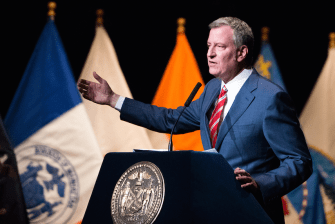Its Showtime for the DOT Parking Team

As usual, traffic was heavy on 125th Street outside the Alhambra Ballroom in central Harlem, Wednesday evening, where the Department of Transportation held its fourth of seven planned workshops to discuss parking strategies in neighborhoods bordering the City’s proposed congestion pricing zone.
According to Bruce Schaller, Deputy Commissioner for Planning and Sustainability at the DOT, the workshops have two goals. First, DOT is listening to concerns residents have about the parking impacts of congestion pricing. Residents’ are worried about "park and ride" commuters who currently drive into Manhattan’s Central Business District, but with the advent of an $8 pricing fee might park just outside the pricing zone and take transit to their final destination.
Second, DOT is suggesting possible parking strategies — "Just ideas," says Schaller — for addressing those impacts and gauging community reaction to them. Schaller emphasizes that DOT wants to get residents of potentially affected communities involved as early as possible.
The Harlem workshop, much more sparsely attended than the one in Park Slope, Brooklyn the night before, drew about thirty neighborhood residents and representatives of numerous local organizations. It was heavily staffed by DOT and its outreach consultant, Howard Stein Hudson. Though Harlem has among the lowest car-ownership rates in the nation, only 20 percent of households have a vehicle, all but a handful of the residents in attendance were car owners and frequent drivers. One contrarian, a long-time local, showed up on a beat-up bike sporting a weathered Transportation Alternatives sticker.
Participants and moderators gathered at three tables to discuss concerns and options. Many were adamant that a motoring lifestyle was the neighborhood norm. Said one woman, a low-income housing developer and trained city planner: "Everyone in my building owns a car."
Said another, also a professional planner: "Harlem has poor services and everyone needs a car to access better services." A friend added that 125th street was a regional shopping and driving destination and more parking was badly needed. In a nod to Yogi Berra, she added "Harlem is a giant, crowded, shopping mall, but there is no parking, so no one comes here anymore."
Participants agreed that Harlem’s streets are already a daily disaster of double parking, endless cruising, placard abuse, and unfair enforcement — especially the wrath-provoking ticketing of double parked church goers and during street cleanings. They also cited concerns about asthma and air pollution and the need to reduce car-use (that is, car-use by outsiders and infidels). At one table, participants also acknowledged that parking on business streets should be treated differently than on residential streets.
DOT presented participants with two main options for addressing parking shortages: charging more for on-street parking in metered areas, and Residential Parking Permits in unmetered areas. Though participants complained about cruising for short-term parking on business streets, they recoiled at having to pay more at the meter even if it saved them time and improved their chance of finding a spot.
Residential parking permits drew widespread support, though exactly how they would work was controversial. "I like them, but DOT seems to be really pushing these RPPs." Said a long-time resident who said she saw RPP’s work in Cambridge, Massachusetts. Most of the car owners liked the idea that RPP’s were a chance to improve their chance of getting free parking, but didn’t like the idea of paying much for them. Other, more tech-oriented ideas like smart parking meters, that can detect feed-the-meter types and alert police, and in-car GPS chips that can alert drivers to open spaces, were met with skepticism.
DOT’s Schaller says that comments will be compiled after the initial round of meetings and incorporated into a larger study of parking trends. The study will help inform a second round of workshops in January at which alternatives will be introduced.
Additional reporting by Erik Shilling. Photo: in2jazz on Flickr
